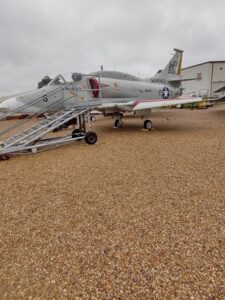Aircraft’s Background
Former Museum member, LtCol Chuck “Dutch” Sprietsma flew this actual aircraft fourteen times during his 20 year Marine Corps career. Chuck flew with VMA-223, VMA-331, and MAG-42 (Det). The Museum’s A-4M has been painted in the colors of the VMA-223 “Bulldogs” to honor his service.
Another Museum member, Major David “Titan” Wilson also flew the A-4M with VMA-331 at MCAS Beaufort, SC during his five years of active duty during the early 70’s. The names of both former Skyhawk “drivers” can be seen on the canopy rails.
This aircraft, A-4M SKYHAWK, on loan courtesy of:
the National Naval Aviation Museum at Pensacola, Florida.
BUREAU/SERIAL # 160036 NNAM ACCESSION # 1999.258.001
Interactive Display
Click on a colored PIN to display additional information (text, video, recording, images).
This feature is an extra benefit as you walk around the display in our Airpark.
WIFI is provided for your mobile device. A network QR code or name/password is provided at the desk.
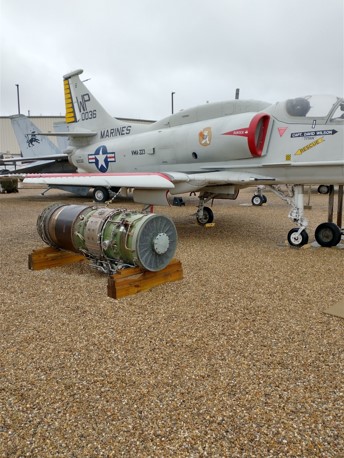



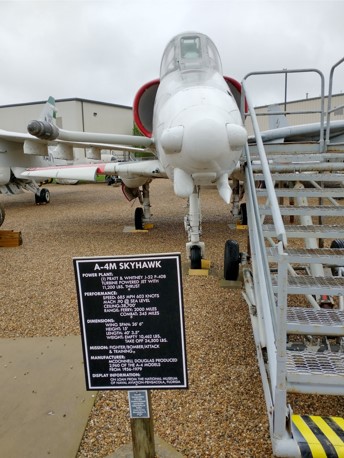



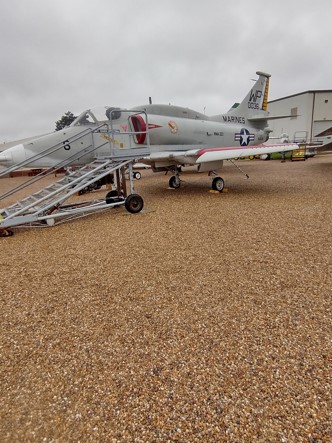


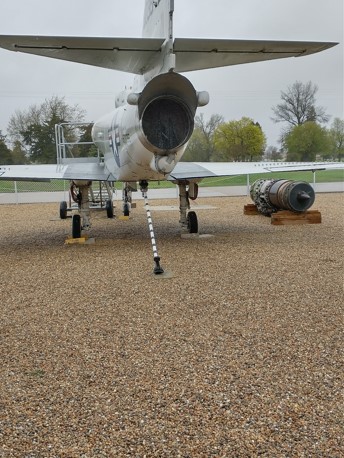


Videos of Interest
Video #1: A-4 Skyhawk Walkaround Run Time (0:59:02)
Video #2: The BEST A-4 Skyhawk Compilation EVER!!! Run Time (0:02:57)
Video #3: Douglas A-4 Skyhawk | Flying Through Time Run Time (0:24:03)
Video #4: Douglas A-4 Skyhawk Light Attack Aircraft Run Time (0:08:34)
History
The last version of the Skyhawk series to be built, the A-4M Skyhawk II, was obviously the most capable. Designed specifically for use by the U.S. Marine Corps, the A-4M improvements included the 11,200 lb thrust Pratt & Whitney J52-P408 engine; a smokeless burner can; a larger, increased-visibility canopy; a ribbon-type drag chute; and a re-positioned Identification Friend or Foe (IFF) antenna atop a squared-off vertical fin.
While the original Skyhawks were designed as a lightweight delivery platform for nuclear weapons, the “Mighty Mikes” were refined into the ultimate close air support weapon to protect the “Mud Marines.” With the Hughes Angle Rate Bombing System installed it was arguably the world’s best close air support jet aircraft ever built. Ironically, the A-4M was the only Skyhawk version, other than the A4A, to not see combat. The A-4M first entered service in 1971 as the Vietnam War was grinding to a halt and left front line service in February 1990 prior to the Gulf War. Marine A-4Ms stayed forward-deployed in Japan throughout their active service life in readiness for a war that never was.
During the ten-year production run of the A-4M, significant improvements were made. Among these was a new heads-up cockpit display. A Hughes Angle/Rate Bombing System (ARBS) was installed which featured both television and laser tracking modes. The sensor package included a television camera and a laser spot tracing system to provide for acquisition and tracking of laser-designated targets. On either side of the nose sensors was an antenna for the ALR-45 radar warning system. Another antenna for the ALR-45 radar homing and warning system was fitted to the top of the vertical fin. Below the nose was an antenna for an ALQ-126 deception jammer transmitter and receiver system.
A total of 160 A-4Ms were built (including two revised A-4Fs). The final A-4M was delivered on February 27, 1979, to the “Bumblebees” of VMA-331, bringing Skyhawk production to an end. At the time, the 27 year production run was the longest for any American tactical aircraft.
The aircraft on display was built in 1976. It spent most of its service life with just two Marine Corps squadrons, the “Bulldogs” of VMA-223, and the “Bumblebees” of VMA-331. It was retired from active service in 1994 with VMA-124 at NAS Memphis. The Prairie Aviation Museum obtained the aircraft in 2000 and is on permanent loan from the National Museum of Naval Aviation in Pensacola, Florida.
ROLE: Single-seat light attack and ground support aircraft, both land and carrier based.
Crew: One
Bureau Number: 160036
SPECIFICATIONS
Dimensions
Length: 41 ft, 3 in
Wing Span: 27 ft, 6 in
Height: 15 ft
Performance
Max Speed: 597 kts (688 mph)
Initial rate of climb: 13,500 ft/min
Ceiling: 44,300 ft (46,200 ft in combat)
Range: 955 nm (1,099 mi) Powerplant: Pratt & Whitney J52-P-408
Thrust: 11,187 lbs
Armament
Guns: 2 × Colt Mk-12 20 mm cannon with 200 rounds each
Up to 5,000 lbs of ordnance carried externally
External Stations: 5
Aircraft’s Previous Duty Station
A-4M Skyhawk
Bureau Number :160036
Nov-76 Accepted at NPRO Long Beach
Apr-76 NARF Pensacola
Jun-79 MCAS Cherry Point VMA-223
Apr-80 MCAS Yuma VMA-223
May-80 MCAS Cherry Point VMA-223
Jan-81 NAS Pensacola VMA-223
Mar-81 MCAS Cherry Point VMA-223
Jun-81 MCAS Iwakuni VMA-223
Jun-81 MCAS Cherry Point VMA-331
Oct-81 MCAS Yuma VMA-331
Nov-81 MCAS Cherry Point VMA-331
May-82 MCAS Iwakuni VMA-33
Jan-83 NAS Atsugi VMA-223
Jan-83 MCAS Iwakuni VMA-223
Mar-83 AFB Kadena VMA-223
May-83 MCAS Cherry Point VMA-223
Oct-84 NAS Pensacola VMA-223
Nov-84 MCAS Cherry Point VMA-223
May-87 NAS Memphis MAG-42 Det.
Feb-94 NAS Memphis MAG-42 Det. A (last known assignment)
Squadron Names:
VMA-223 Bulldogs
VMA-331 Bumblebees
MAG-42 Marine Aircraft Group Forty Two

